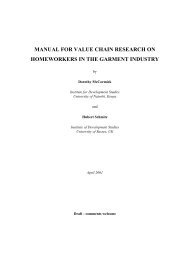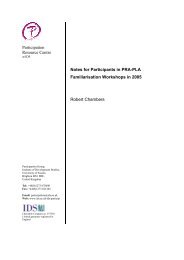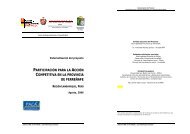OECD Culture and Local Development.pdf - PACA
OECD Culture and Local Development.pdf - PACA
OECD Culture and Local Development.pdf - PACA
You also want an ePaper? Increase the reach of your titles
YUMPU automatically turns print PDFs into web optimized ePapers that Google loves.
CONCLUSION - DESIGNING LOCAL PUBLIC POLICIES<br />
information to consumers, <strong>and</strong> sometimes granting subsidies to make cultural<br />
goods <strong>and</strong> services more accessible.<br />
• When they become specific, these policies will observe scientific or political<br />
criteria, but rarely will they reflect a desire to redistribute cultural activities within<br />
a territory.<br />
• Any specific government intervention in culture can lead to the substitution of<br />
collective or even bureaucratic choices for private choices, something that is<br />
traditionally subject to criticism in the field of culture.<br />
These factors explain why it is so difficult for governments to support local initiatives<br />
in this field, unless of course such initiatives have a scientific rationale or are based<br />
on redistribution goals openly espoused by governments. This view is fairly traditional<br />
<strong>and</strong> takes no account of the new roles that culture plays in local development, those<br />
relating to producing a culture for the territory, or to instituting creativity districts. In<br />
adopting too narrow a view of culture — reducing it essentially to its tourism aspect<br />
— these other effects may be overlooked. Governments can have a role to play,<br />
whether it is in training, in providing information on cultural product markets, or in doing<br />
the research needed to maintain <strong>and</strong> adapt artistic knowledge <strong>and</strong> know-how:<br />
• by ensuring that ministries <strong>and</strong> departments underst<strong>and</strong> <strong>and</strong> accept their<br />
responsibility for such objectives (education systems can instill a project<br />
culture; the justice system must guard against fakes <strong>and</strong> counterfeits; l<strong>and</strong>-use<br />
legislation must allow craft enterprises to continue operating under reasonable<br />
conditions in traditional districts, etc.);<br />
• by fostering an environment conducive to the local contributions of culture:<br />
supporting a system of artistic training; recognising, classifying <strong>and</strong> protecting<br />
heritage resources; helping certain professions to survive <strong>and</strong> to pass on their<br />
know-how; combating forgeries, etc.;<br />
• by offering a decentralised decision-making framework where local stakeholders<br />
can debate the issues among themselves <strong>and</strong> with central authorities;<br />
• by developing incentives in the form of contracts, funding competitions, etc.<br />
We must certainly not ignore the risk of bureaucratising culture through a centralised<br />
approach to interventions. But neither can we ignore the existence <strong>and</strong> use values<br />
that culture generates to the benefit of local development.<br />
164 CULTURE AND LOCAL DEVELOPMENT - ISBN 92-64-00990-6 - © <strong>OECD</strong> 2005














